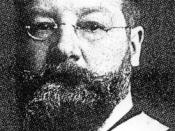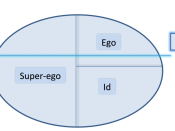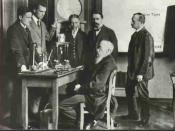Major Schools of Thought in Psychology
Major Schools of Thought in Psychology
Desirae Carrion
Kaplan University
Abstract
Several researchers contributed to the development of psychology as a separate field of study. "Their work, along with Wundt's work, made Germany the undisputed center of the movement" (Schultz, & Schultz, 2011p. 77). The world's first psychological laboratory was opened by Wilhelm Wundt in 1879 at the University of Leipzig (Schultz &Schultz, 2011).When researchers started to rely on controlled observations and experimentation to study the human mind psychology began to obtain its own identity separate from its philosophical roots (Schultz &Schultz, 2011). Scientific study was occurring in several psychological laboratories during this time and that is when the debate over how to describe and explain the human mind and behavior began. In this paper, I will be discussing some of psychologies history by identifying the major schools of thought. Each school of thought will have its strengths and weaknesses, and each one brings something different to our understanding of the human mind and behavior.
The Five major schools of thought that will be addressed in this paper are structuralism, functionalism, behaviorism, gestalt, and psychoanalysis. Furthermore, I will also give a description of how I imagine psychology to be in the future.
Major Schools of thought in Psychology
Structuralism was the first school of thought developed by Edward Bradford Titchener, who had studied under Wilhelm Wundt (Schultz & Schultz, 2011). Structuralists believed that they could scientifically analyze conscious experience by identifying the basic elements or structures of the mind. Titchener's main focus was on the mental elements and their mechanical linking through the process of association (Schultz & Schultz, 2011). According to Titchener, the subject matter of psychology is conscious experience as that experience is dependent on the person who is actually experiencing...


